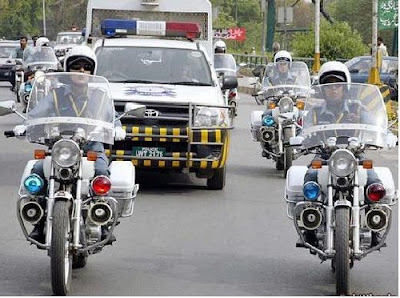Ending Corruption Not a Priority in South Asia
 Under the US Foreign Corrupt Practices Act (FCPA), all American companies are required to provide details of illegal payments made in foreign countries.
Under the US Foreign Corrupt Practices Act (FCPA), all American companies are required to provide details of illegal payments made in foreign countries. Paxar Corporation, a New York listed company recently acquired by Avery, acknowledged paying $30,000 to bribe Pakistani customs officials in 2008 through its local customs broker. Avery, a California-based company, manufactures and markets various office products in several dozen countries around the world.
In a settlement with the SEC, Avery has agreed to pay over $300,000 in fines, and accepted SEC's cease-and-desist order to stop its corrupt practices.
Here is a list of FCPA violations involving Indian entities reported to the Indian Prime Minister by India's US Ambassador Meera Shanker in Washington:
* On January 9, 2009, Mario Covino of Control Companies allegedly pleaded guilty to making illegal payments of over $ 1 million to employees of state-owned entities, including the Maharashtra State Electricity Board.
* On Feb 14, 2008, Westinghouse Air Brake Technologies Corporation’s Indian subsidiary, Pioneer Friction Ltd, settled civil charges in connection with improper payments to employees of Indian Railways. The $137,400-payment was made between 2001 and 2005.
* Subsidiaries of York International Corporation allegedly made improper payments of over $ 7.5 million to secure orders in various countries, including India. Payments were made from 2001 to 2006.
* C Srinivasan, a former president of A T Kearney India Ltd, allegedly made improper payments of $720,000 to senior employees of two partially state owned enterprises in India between 2001 and 2003.
* Textron’s subsidiaries allegedly made improper payments to secure contracts in various countries including India in the 2001-2005 period.
* Dow Chemicals subsidiary, DE-Nocil Crop Protection Ltd, allegedly made improper payments to various officials, including to an official in Central Insecticides Board. Pride International too, may have made third-party payments.
In spite of the well-publicized actions of the US government under FCPA, there appears to have been no government investigations ordered or actions taken against the corrupt officials on the receiving end of the reported bribes from the US companies in India and Pakistan.
It is because of the total impunity for the corrupt politicians and officials in Pakistan that corruption has surged by whopping 400 percent in the last three years, according to the National Corruption Perception Survey 2009 carried out by Transparency International. The return of democracy under a US-sponsored amnesty for the current leadership has not helped in holding the corrupt accountable. On Transparency International survey for 2008, Pakistan fares badly, ranking at 134 on a list of 180 nations surveyed. By comparison, India ranks higher at 85 while Bangladesh ranks lower at 147.
The National Corruption Perception Survey 2009 (NCPS 2009) indicates that the overall Corruption in 2002 has increased from Rs.45 Billion to Rs.195 Billion in 2009. Police and Power maintained their ranking as the top two most corrupt sectors.
There has been remarkable improvement in Judiciary. As compared to 2006 when it was ranked 3rd most corrupt sector, in 2009 Judiciary is ranked 7th, The News reports.
Postscript: According of Professor Mike Koehler of Butler University School of Law, the FCPA does not contain any affirmative disclosure obligation, as the opening paragraph of this post suggests. However, I do believe that there are certain practical benefits of self-disclosure, such as no prosecution for past violations or lighter or suspended sentences etc.
An example is the case involving a Dutch software company, Paradigm, that caters to the oil and gas industry. After the company relocated its principal place of business from Israel to Texas in 2005, it discovered it had either made or promised numerous bribes to officials in five nations. The company pre-emptively confessed to Justice Department prosecutors, instituted remedial compliance measures, and ultimately ended up with an 18-month non-prosecution agreement.
Related Links:
Haq's Musings
FCPA Blog
Avery Acknowledges Bribing Pakistani Officials
FCPA Violations Involving Indian Entities
The Story of Graft
Anti-Corruption Day, Blagojevich and Zardari
Bhutto Convicted in Switzerland
Corruption in Pakistan
Transparency International Survey 2007
Is Siemens Guilty?
Zardari Corruption Probe



Comments
"Under the US Foreign Corrupt Practices Act (FCPA), all American companies are required to provide details of illegal payments made in foreign countries"
is incorrect.
The FCPA does not contain any affirmative disclosure obligation.
Kind Regards,
Mike Koehler
Assistant Professor of Business Law
Butler University
Editor - FCPA Professor Blog
http://fcpaprofessor.blogspot.com/
Thanks for the correction.
I do believe that there are certain practical benefits of self-disclosure, such as no prosecution for past violations or lighter or suspended sentences etc.
An example is the case involving a Dutch software company, Paradigm, that caters to the oil and gas industry. After the company relocated its principal place of business from Israel to Texas in 2005, it discovered it had either made or promised numerous bribes to officials in five nations. The company pre-emptively confessed to Justice Department prosecutors, instituted remedial compliance measures, and ultimately ended up with an 18-month non-prosecution agreement.
It’s hard to imagine a public official with more toys than Teodoro Nguema Obiang Mangue, who spent $300 million on Ferraris, a Gulfstream jet, a California mansion and even Michael Jackson’s “Thriller” jacket. The buying spree is all the more remarkable since this scion of the ruling family of Equatorial Guinea, one of Africa’s smallest countries, bought all this while on an official salary of $100,000 a year.
But legal action by the Justice Department has brought an end to Mr. Obiang’s spendthrift ways. His $30 million Malibu estate is on the market, as are his luxury cars and six life-size Jackson statues. Proceeds from these sales are earmarked for citizens of Equatorial Guinea, who prosecutors claim are victims of Mr. Obiang’s “relentless embezzlement and extortion.”
The turnabout in Mr. Obiang’s fortunes is part of an effort by the federal government to recover assets it says were stolen by foreign officials — dictators, politicians and ruling elites — and laundered in the United States. Since its start in 2010, the Kleptocracy Asset Recovery Initiative has grown to include a dozen government lawyers and teams from the F.B.I. and Homeland Security.
“We don’t want the United States to be a haven for this money,” said Leslie Caldwell, assistant attorney general and head of the criminal division. “If it comes into this country, we have the ability to reach out and grab it. Kleptocracy undermines the rule of law and breeds crime and terrorism.”
Yet for all this firepower, the Justice Department has found that bringing cases against kleptocrats has been daunting, and seizing their assets even harder still. A total of 25 cases have been brought against 20 foreign officials under the Kleptocracy initiative, and the government is seeking to seize $1.5 billion, mainly in American real estate and bank accounts. But most of that money remains in legal limbo.
The government is stepping up efforts to halt the flow of illicit money into the United States through stronger anti-money-laundering rules, investigations into secret buyers of high-end real estate and measures to identify owners of anonymous shell corporations used to hide financial transactions.
Government prosecutors have taken aim at funds held by officials from Nigeria, Ukraine, Uzbekistan, South Korea, Taiwan, Honduras and even Canada. One case involves $630 million once controlled by the late Sani Abacha, the strong-arm Nigerian general who ran the country in the 1990s and reportedly took billions from it.
Another seeks $250 million said to be embezzled by Pavlo Lazarenko, the former Ukrainian prime minister who spent several years in an American prison on money-laundering charges. Then there is the glamorous Gulnara Karimova, the Harvard-educated daughter of the Uzbek president, who the government says absconded with $300 million from a telecom scheme and parked it in an American bank’s overseas branch.
---
In violation of a court order, Mr. Obiang whisked some of his holdings out of the United States and put them on display back home — including Michael Jackson’s famous white jewel-encrusted glove and all of his gold and platinum albums.
“Despite the efforts of some Western institutions to prevent these objects from coming to our country, justice has returned them to their authentic owner” an Equatorial Guinea government website says. Gone, too, is the $38.5 million Gulfstream jet — it flew away.
There are concerns that the money might end up in the Obiang family’s pockets. But the United States may have little choice. “No one is confident that this will work perfectly,” said Kenneth Hurwitz, senior legal officer with the Open Society Justice Initiative. “But that’s still better than if the U.S. didn’t try.”